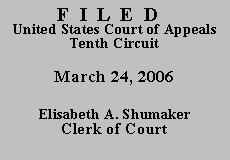

| OLIVER T. STRINGER, |
|
| v. | |
| ERIC FRANKLIN, Warden, James Crabtree Correctional Center, |
Stringer sought a writ of habeas corpus in the Western District of Oklahoma, pursuant to 28 U.S.C. § 2254. The district court denied that petition on the merits on July 27, 2004, but Stringer did not appeal the denial to this court until April 11, 2005. At that time, we dismissed his appeal as untimely.
Stringer subsequently filed a motion with the district court to reopen the time to file an appeal, pursuant to Rule 4(a)(6) of the Federal Rules of Appellate Procedure.(1)
The district court denied the motion on the grounds that Stringer's motion did not meet the time requirements under Rule 4(a)(6)(A). He now appeals that decision to this court and seeks a COA.
On appeal Stringer argues that the district court erred in denying the motion under Rule 4(a)(6) and asks for a COA to bring this appeal.(2) We will issue a COA if an applicant "has made a substantial showing of the denial of a constitutional right." 28 U.S.C. § 2253(c)(2). This means that he must demonstrate "that reasonable jurists could debate whether (or, for that matter, agree that) the petition should have been resolved in a different manner or that the issues presented were 'adequate to deserve encouragement to proceed further.'" Slack v. McDaniel, 529 U.S. 473, 484 (2000).
Here, reasonable jurists could not debate whether his Rule 4(a)(6) motion was appropriate. Rule 4(a)(6) permits the district court to "reopen the time to file an appeal" if three conditions are satisfied, one of which is that "the motion is filed within 180 days after the judgment or order is entered or within 7 days after the moving party receives notice . . . of the entry, whichever is earlier." Fed. R. App. P. 4(a)(6)(B) (emphasis added). Stringer claims he did not receive notice of the judgment for almost ten months after it was entered, essentially asking the court to equitably toll the 180-day limitation. However, it is clearly settled that
"nothing within Rule 4(a)(6) indicates it is permissive or that its limitations may be waived for equitable reasons. The 180-day limitation . . . is specific and unequivocal." Clark v. Lavallie, 204 F.3d 1038, 1040 (10th Cir. 2000).
Even if we were to consider equitable tolling, the motion would have been denied for failure to file the motion within seven days of receiving notice of the judgment. The district court found that "more than seven days ha[d] passed since Petitioner received notice of the entry of judgment." Dist. Ct. Order at 2. And Stringer does not challenge this finding on appeal. Thus, it would have been improper for the district court to grant Stringer's motion.
Accordingly, we DENY Stringer's application for a COA and DISMISS his appeal. His motion to proceed in forma pauperis is DENIED.
Entered for the Court
Timothy M. Tymkovich
Circuit Judge
*. This order is not binding precedent, except under the doctrines of law of the case, res judicata, and collateral estoppel. The court generally disfavors the citation of orders; nevertheless, an order may be cited under the terms and conditions of 10th Cir. R. 36.3.
2. After examining the briefs and the appellate record, this three-judge panel has determined unanimously that oral argument would not be of material assistance in the determination of this appeal. See Fed. R. App. P. 34(a); 10th Cir. R. 34.1(G). The cause is therefore ordered submitted without oral argument.
1.Rule 4(a)(6) states:
Reopening the Time to File an Appeal. The district court may reopen the time to file an appeal for a period of 14 days after the date when its order to reopen is entered, but only if all the following conditions are satisfied: (A) the court finds that the moving party did not receive notice under Federal Rule of Civil Procedure 77(d) of the entry of the judgment or order sought to be appealed within 21 days after entry; (B) the motion is filed within 180 days after the judgment or order is entered or within 7 days after the moving party receives notice under Federal Rule of Civil Procedure 77(d) of the entry, whichever is earlier; and (C) the court finds that no party would be prejudiced.
2. In his motion to proceed without payment of costs, Stringer also claims that he is raising the issue of "[w]hether Federal Rule of Appellate Procedure 4(a)(6) overrides Federal Rule of Appellate Procedure 60(b)." As there is no Appellate Rule 60(b), we assume he meant Rule 60(b) of the Federal Rules of Civil Procedure. He does not raise this issue in his opening brief, so it is not necessary to reach the merits of this claim, but we note that we already resolved this issue in Clark v. Lavallie, 204 F.3d 1038 (10th Cir. 2000) (holding that Civil Rule 60(b) relief was not available to pro se plaintiffs who did not comply with Appellate Rule 4(a)(6)).